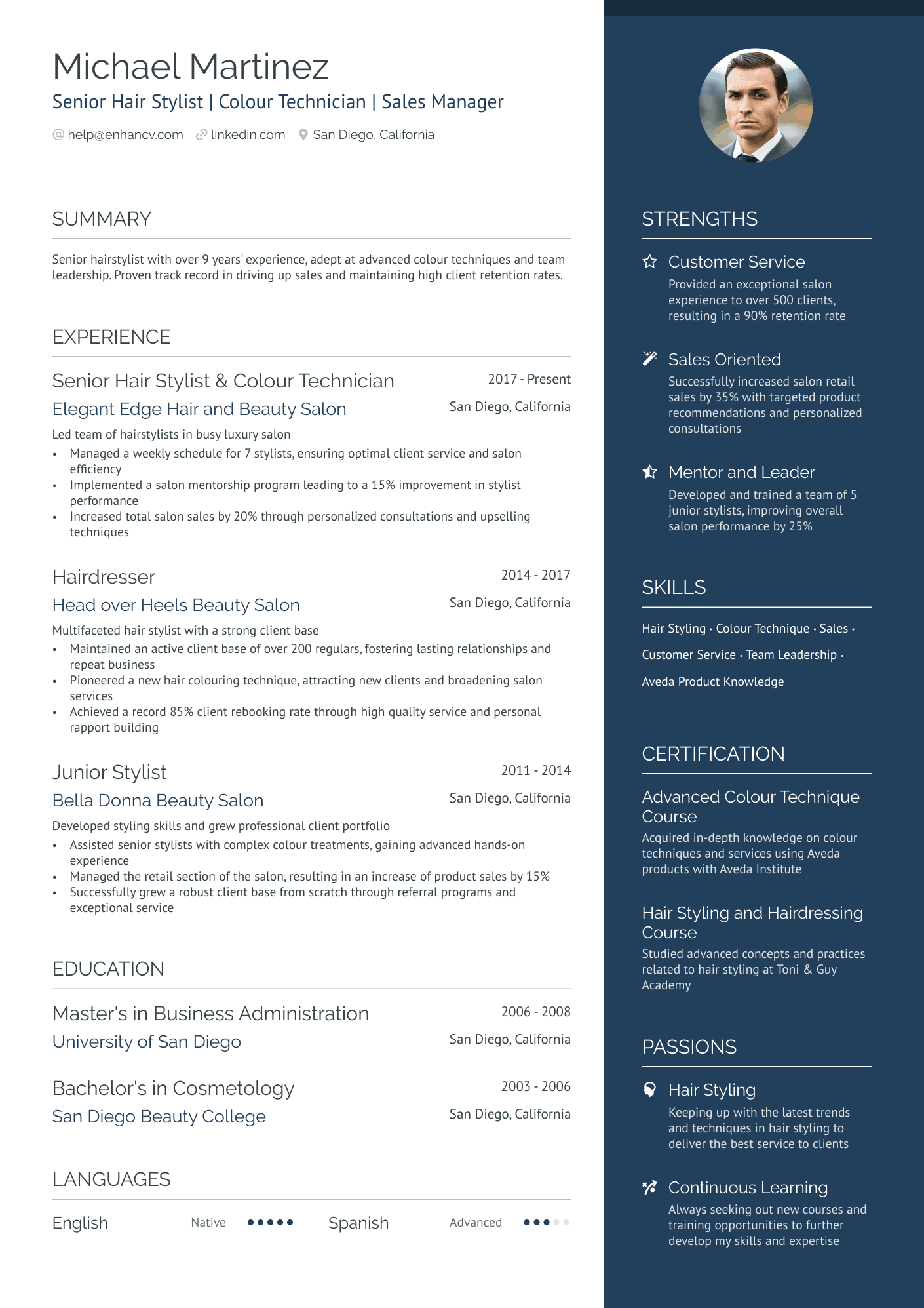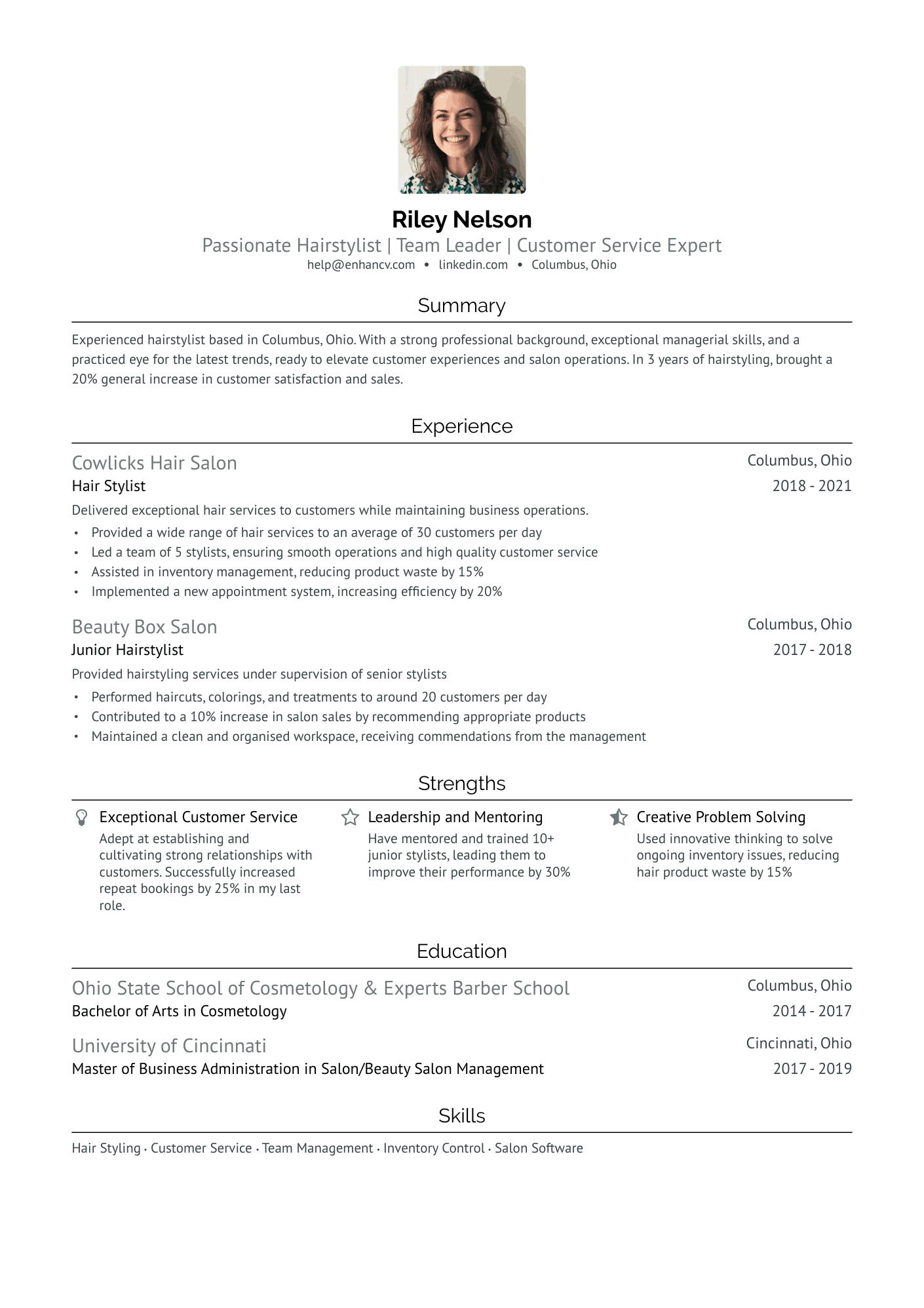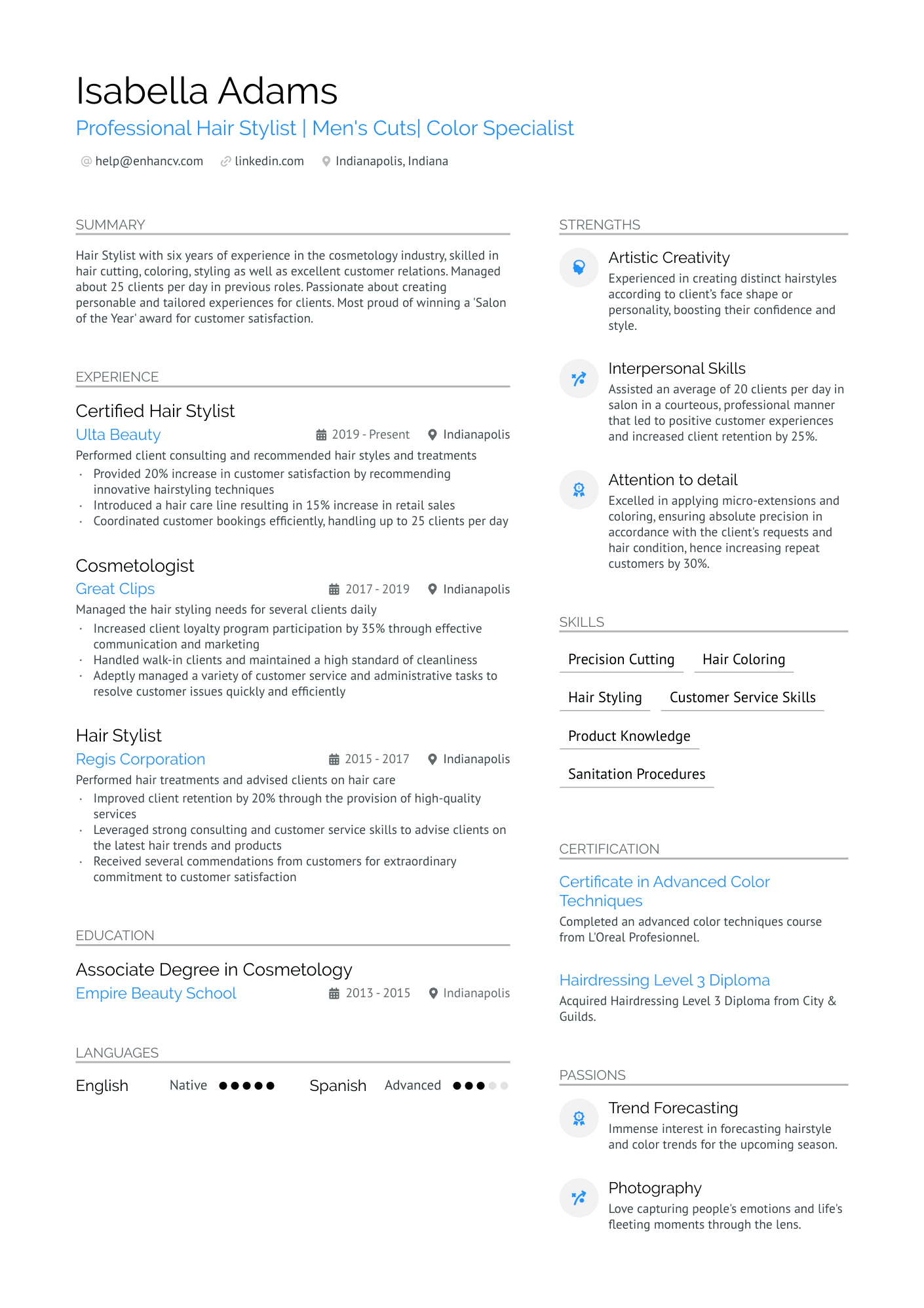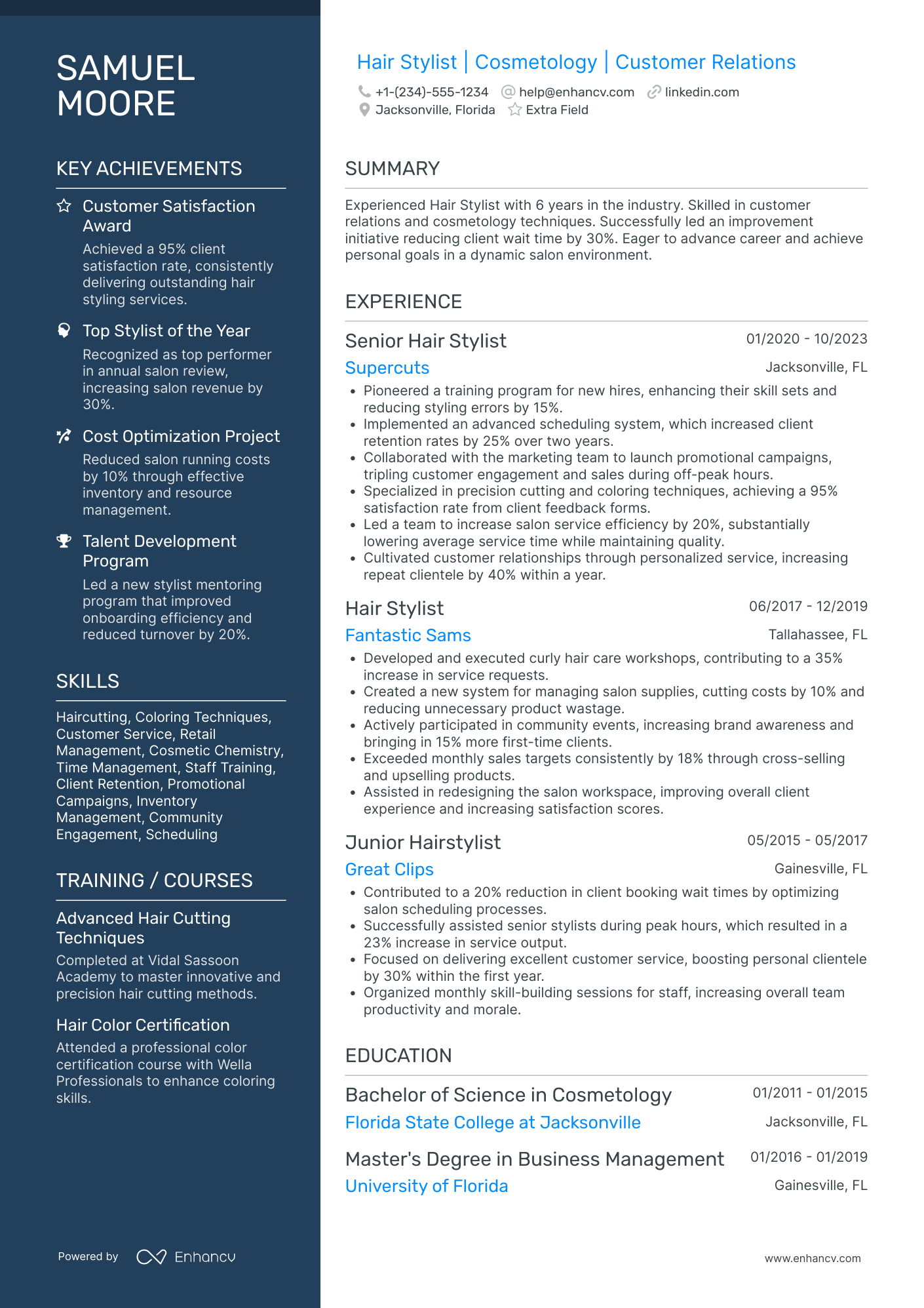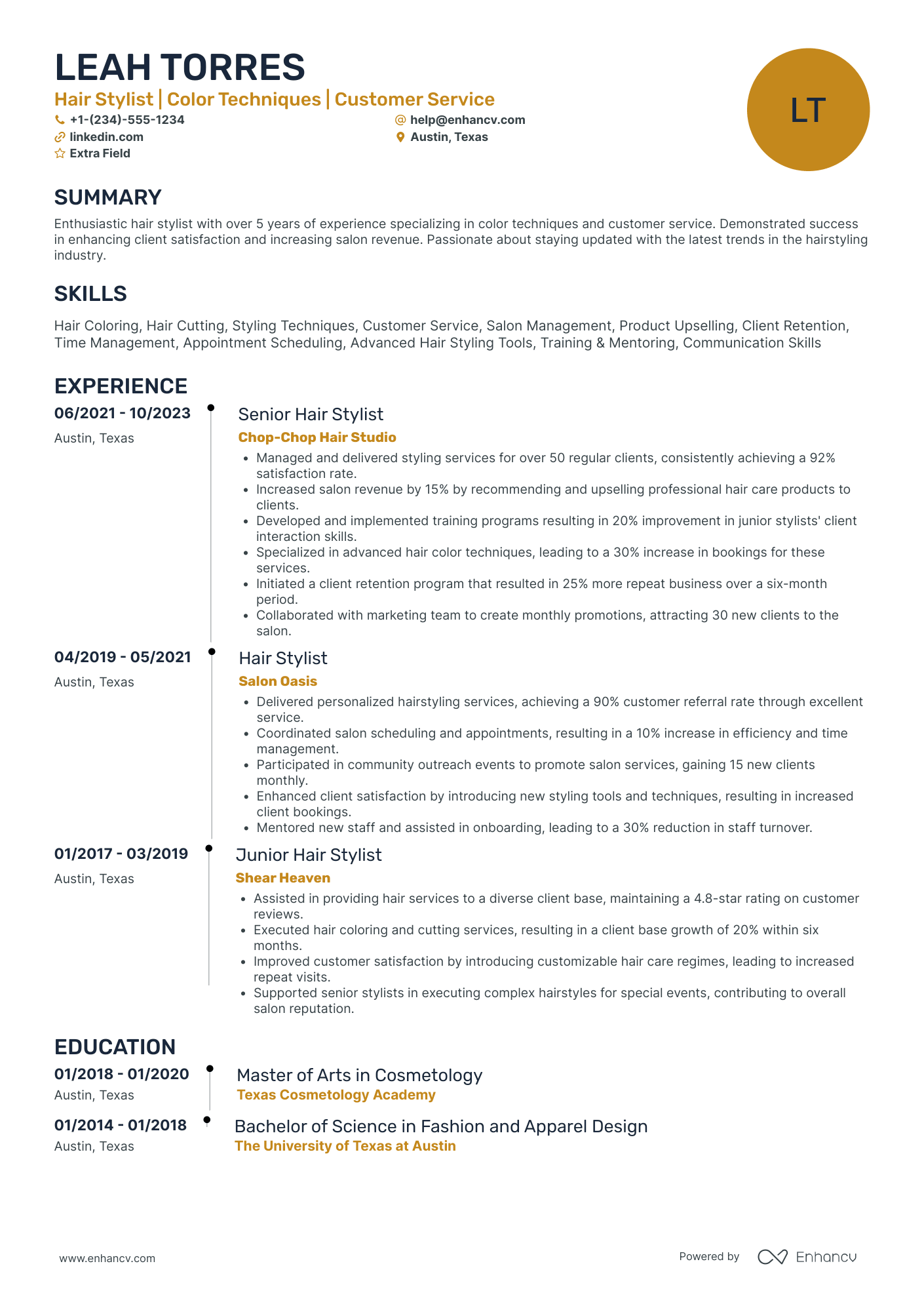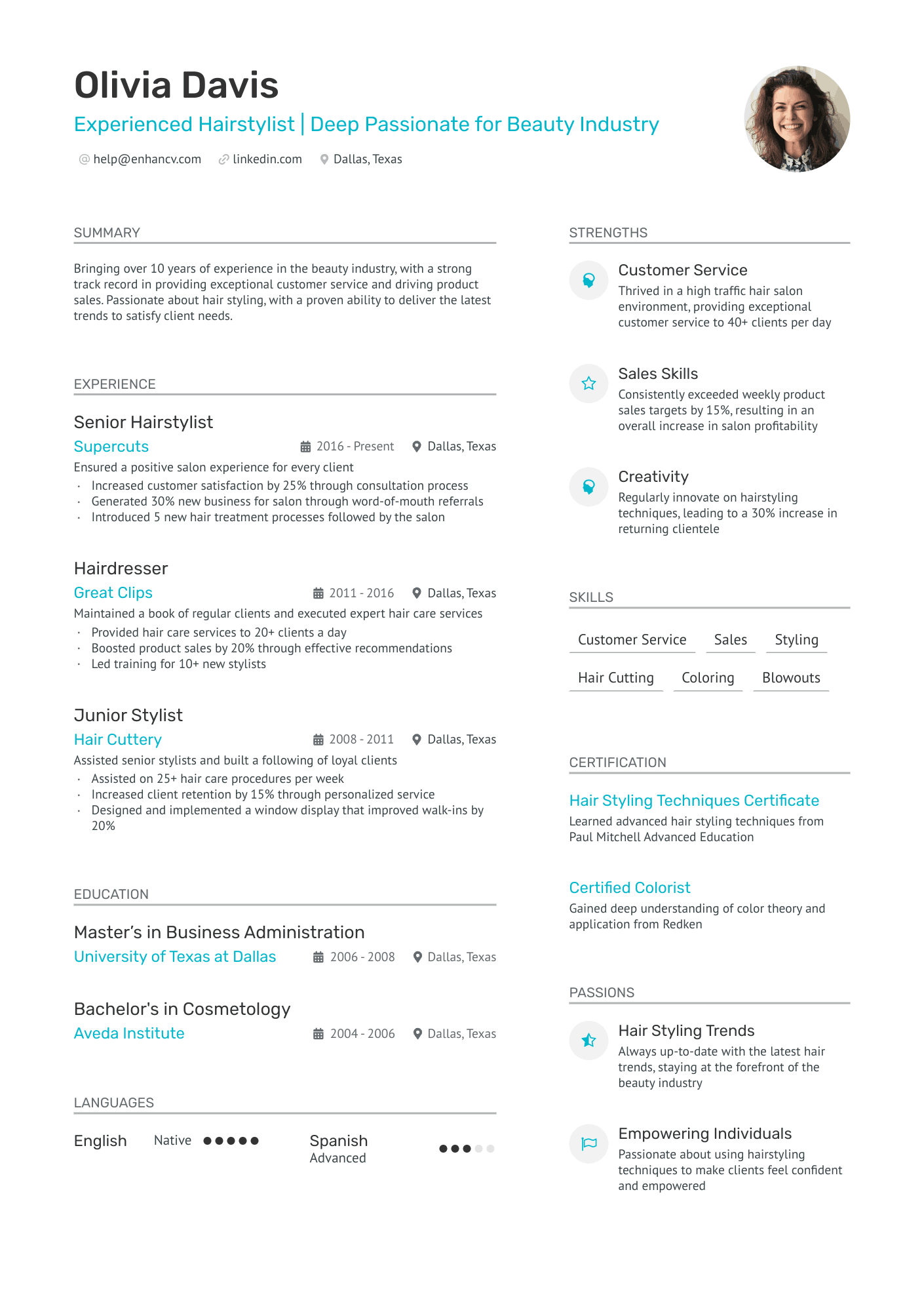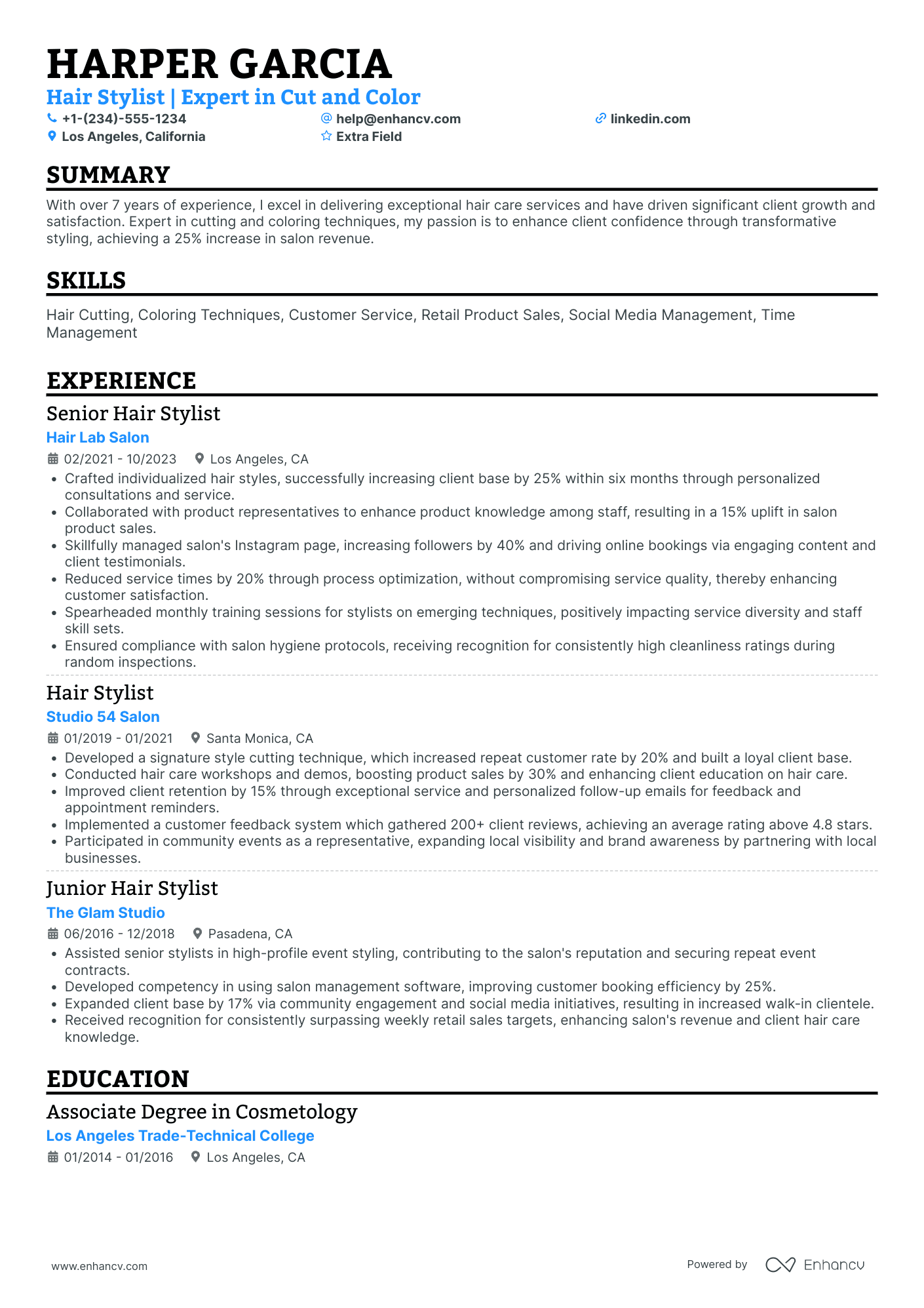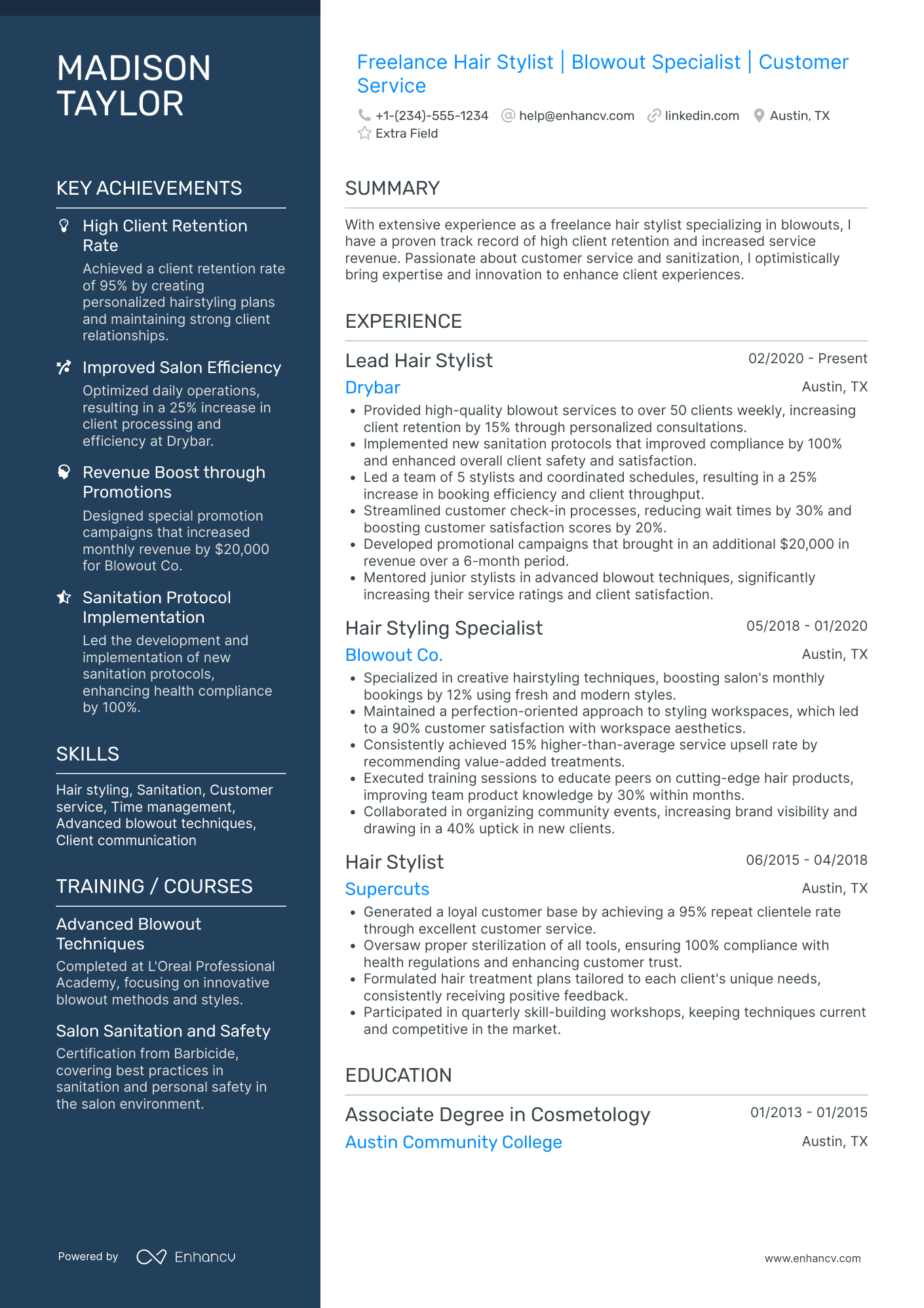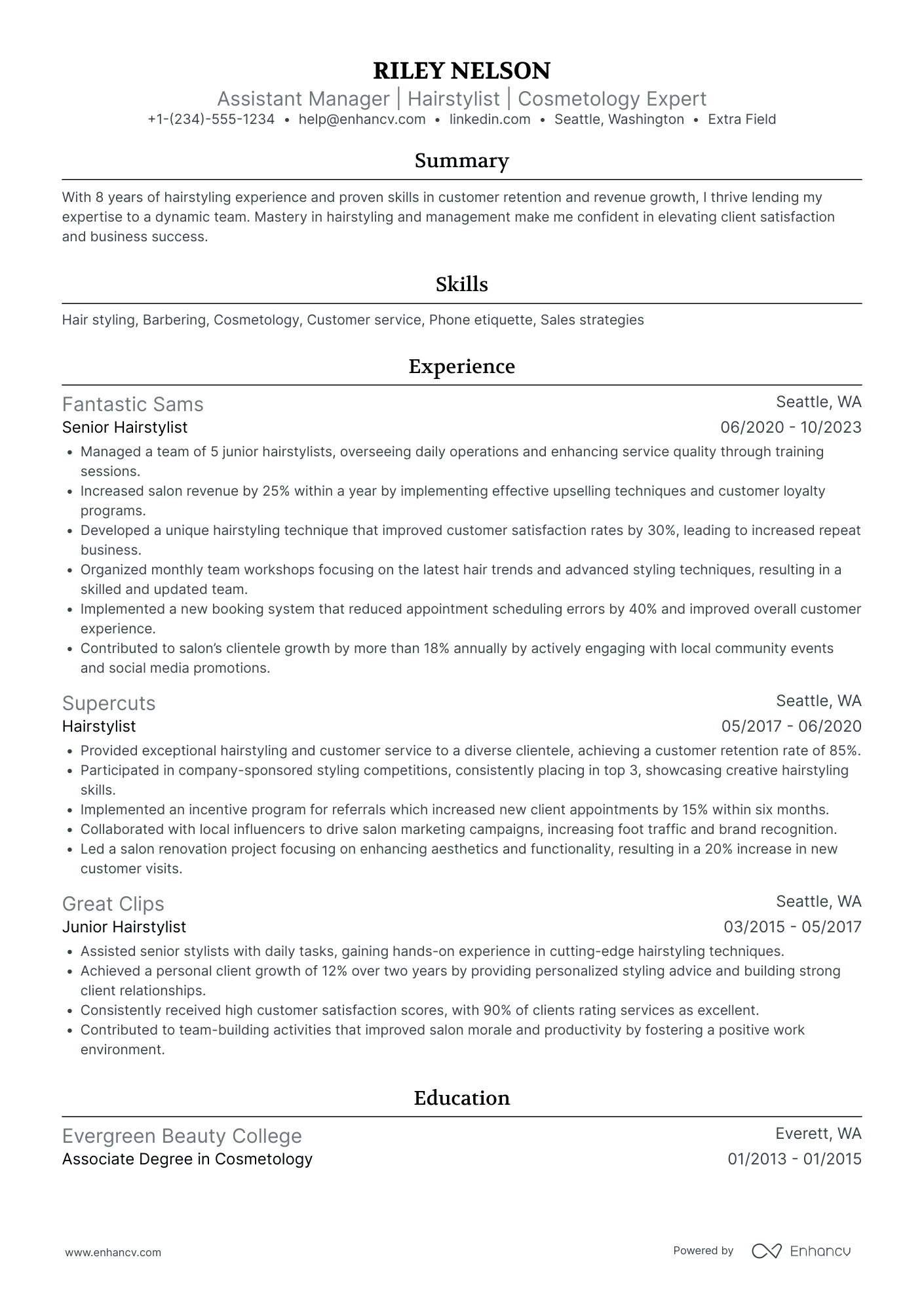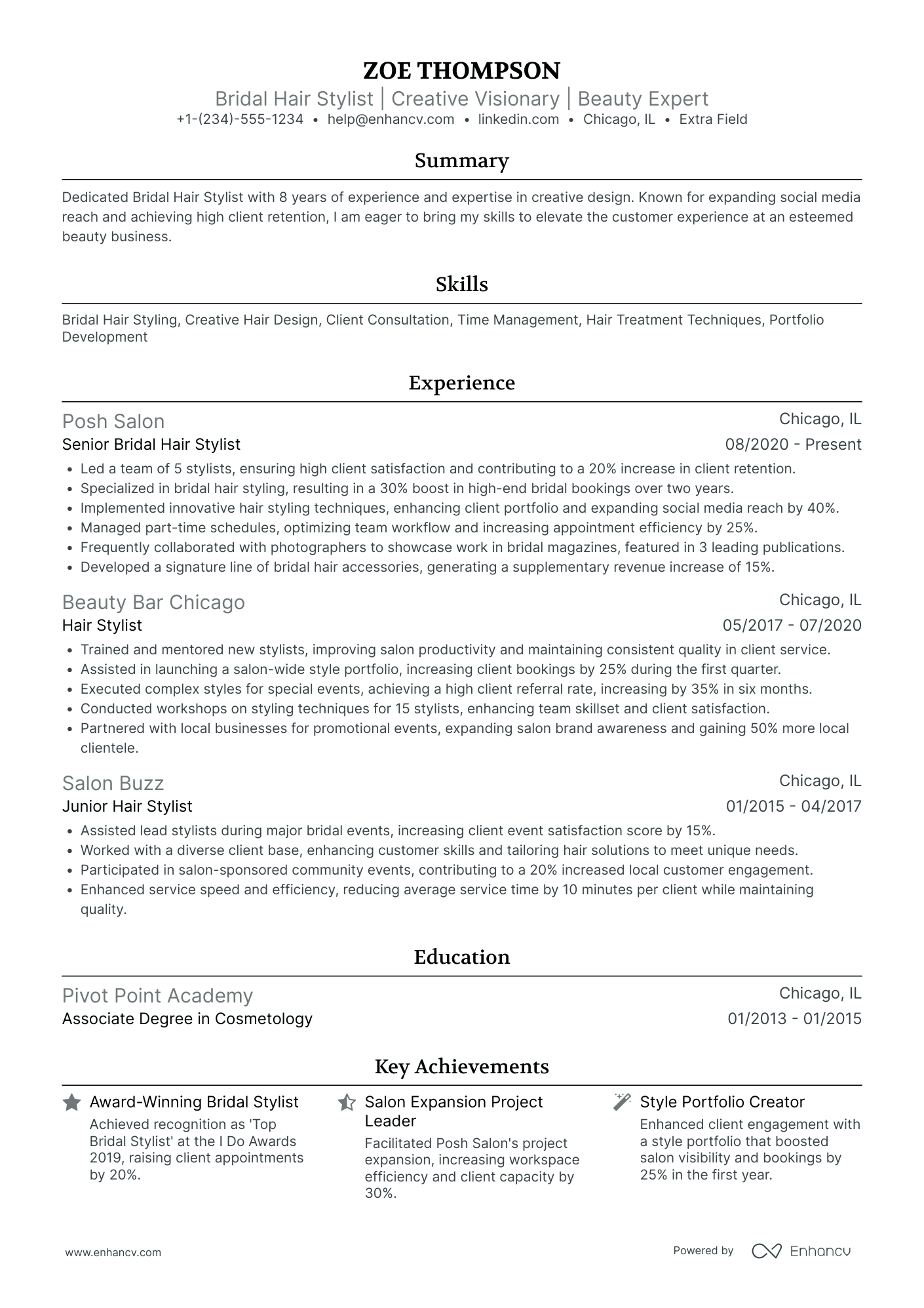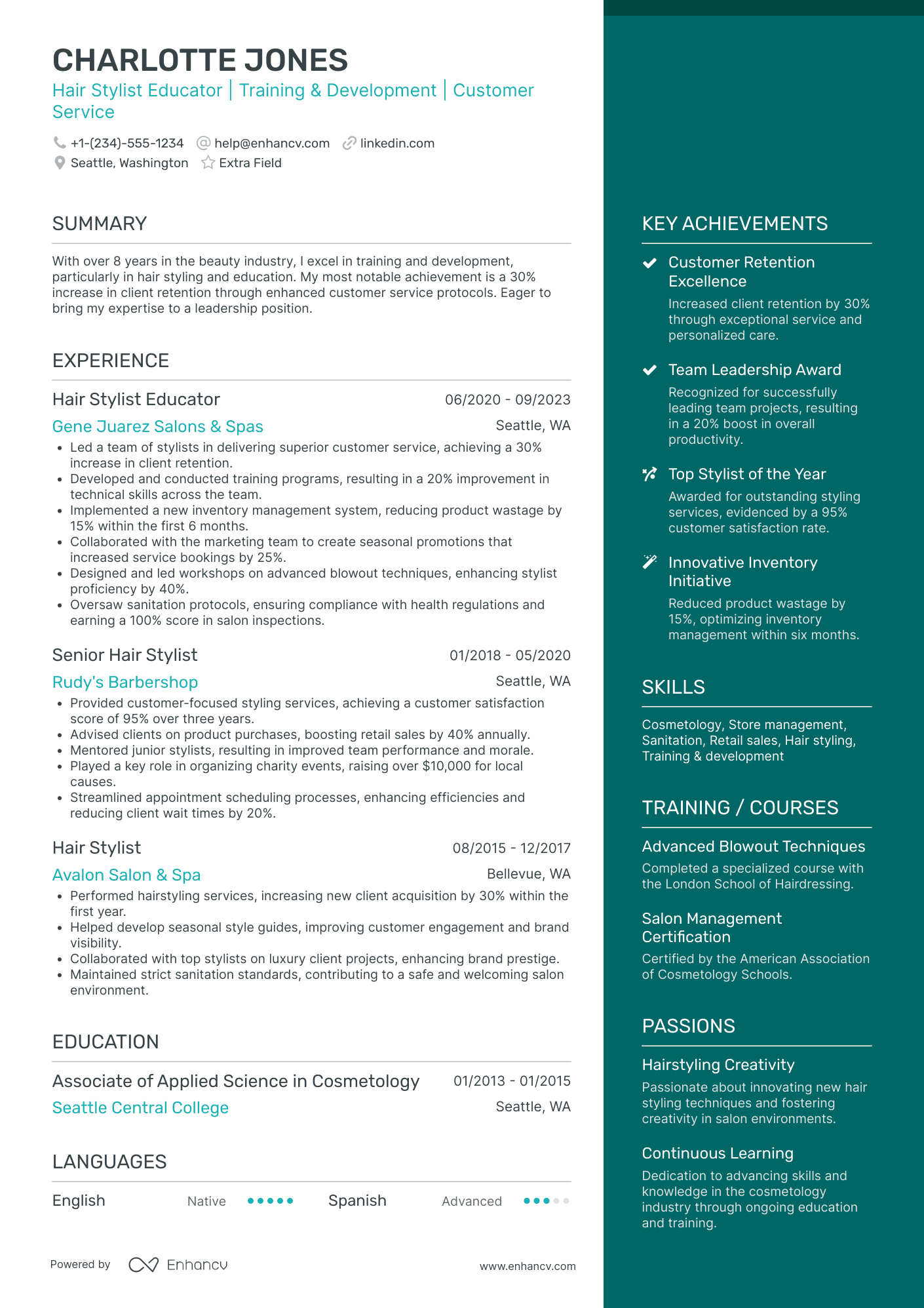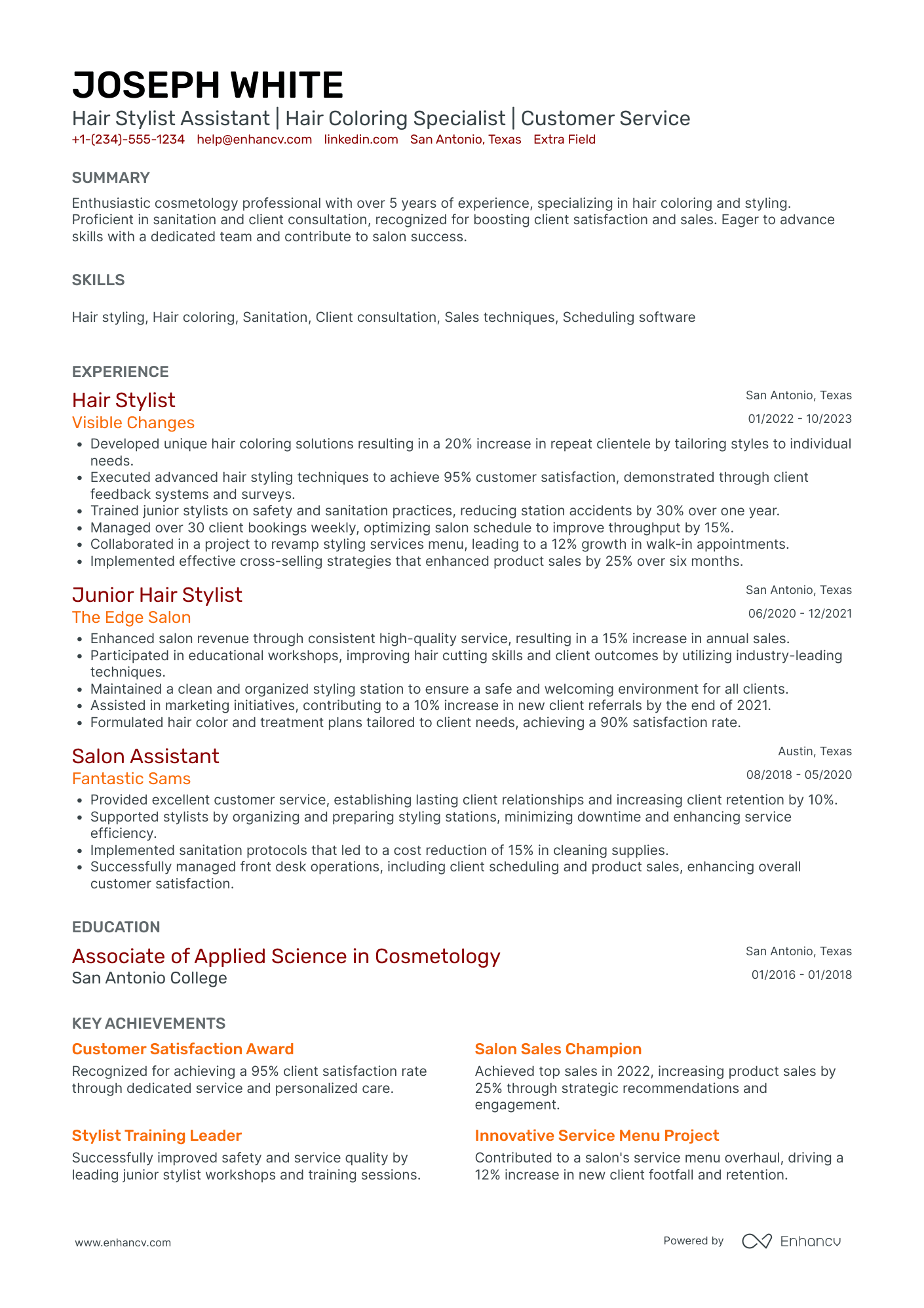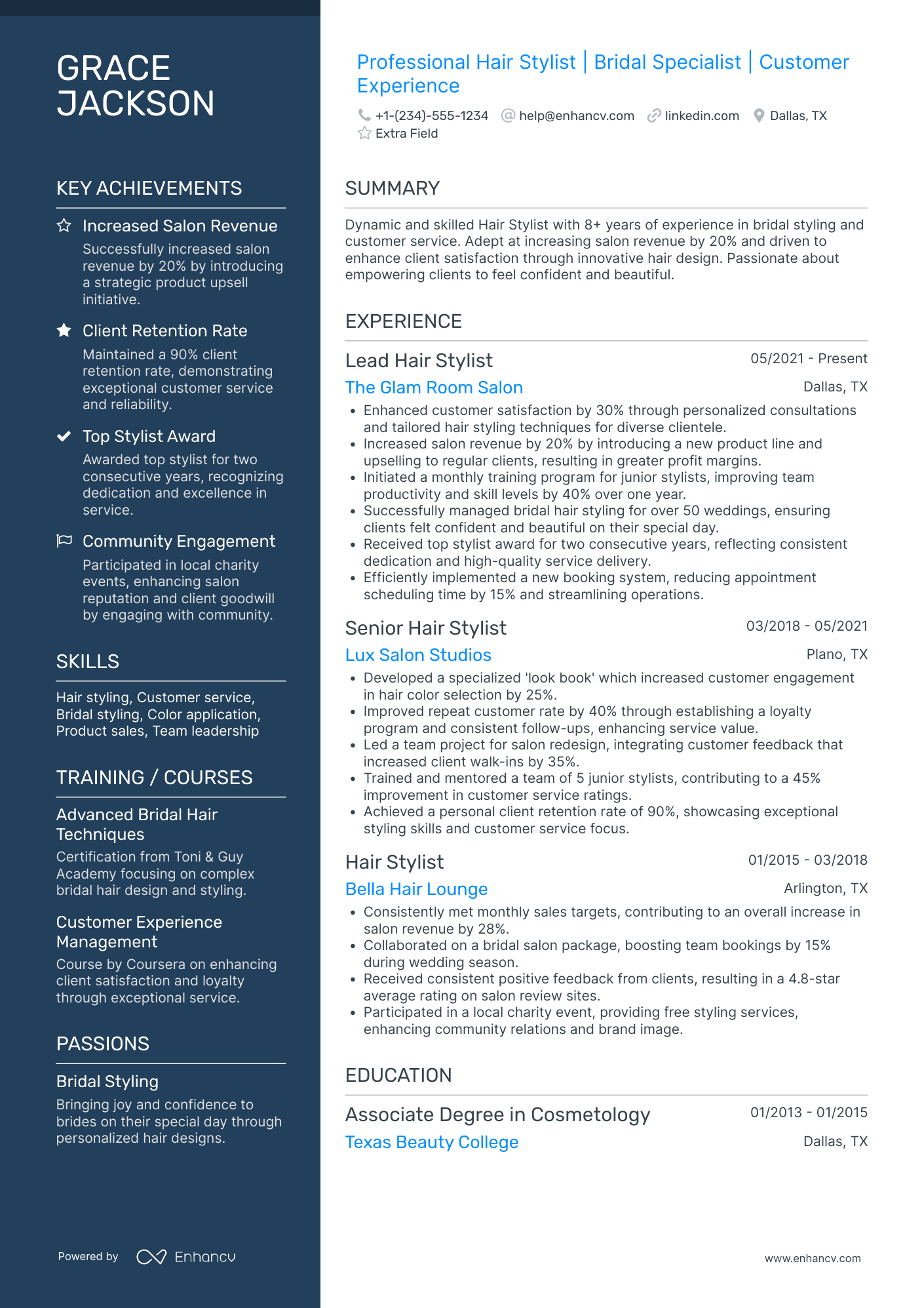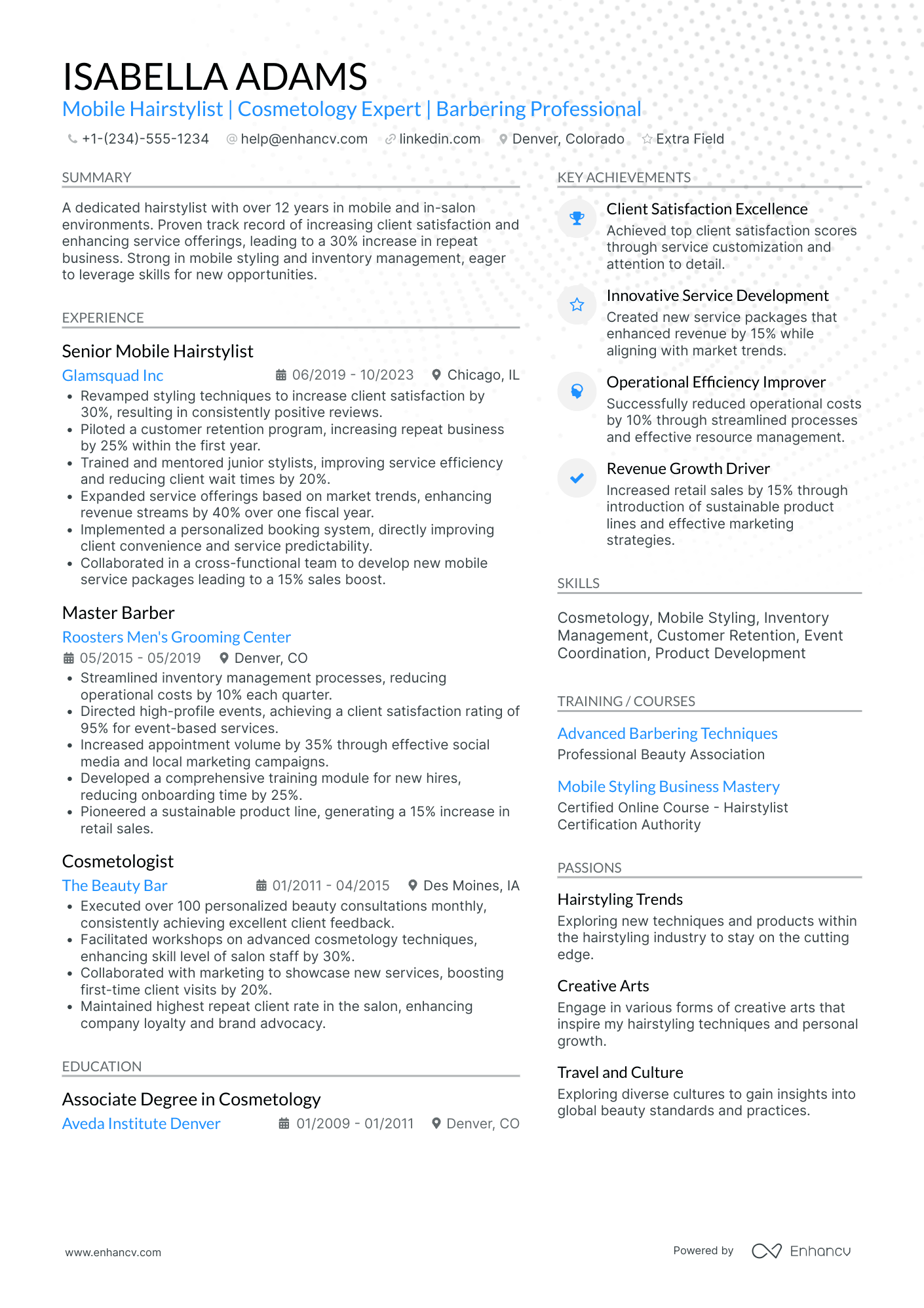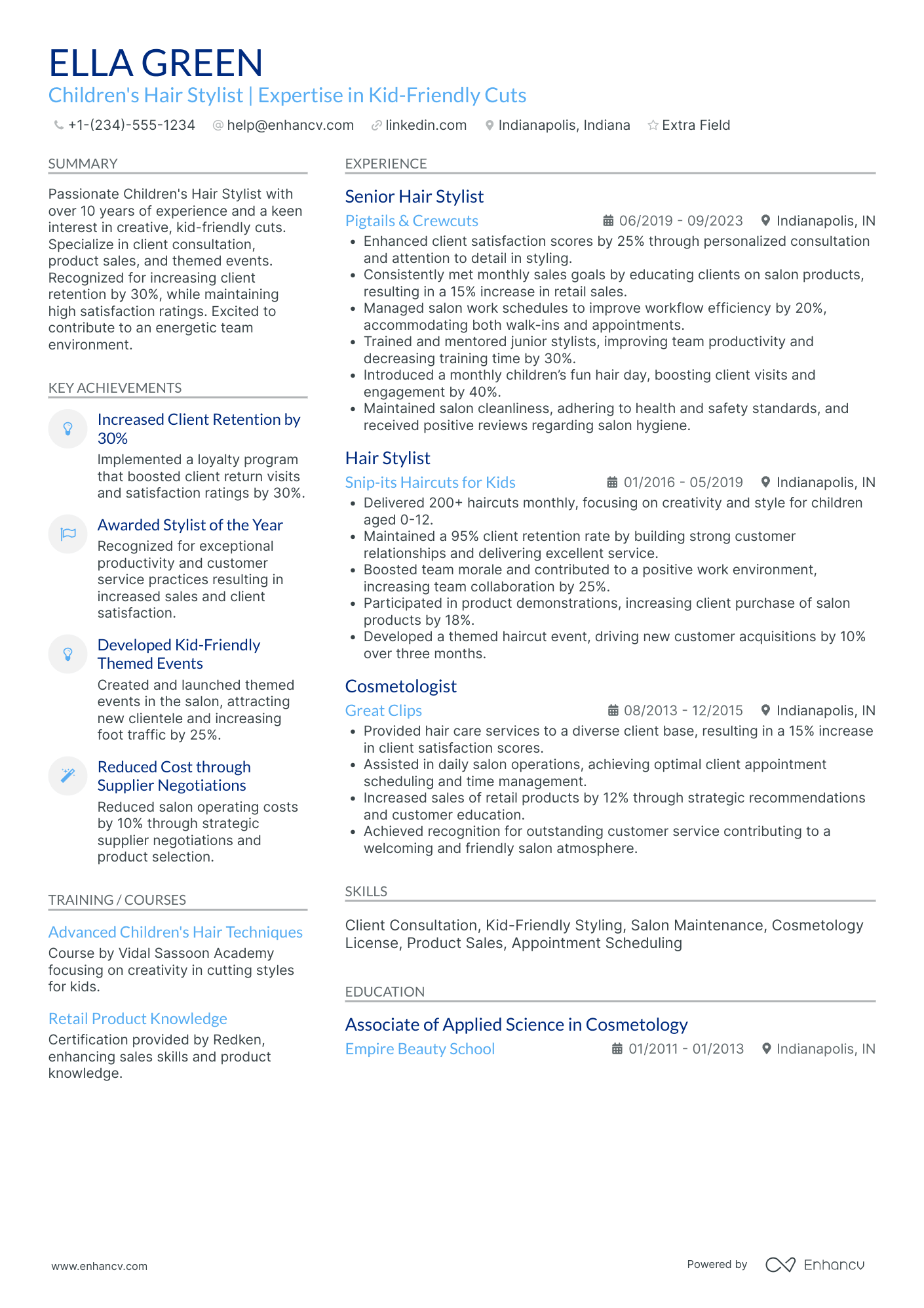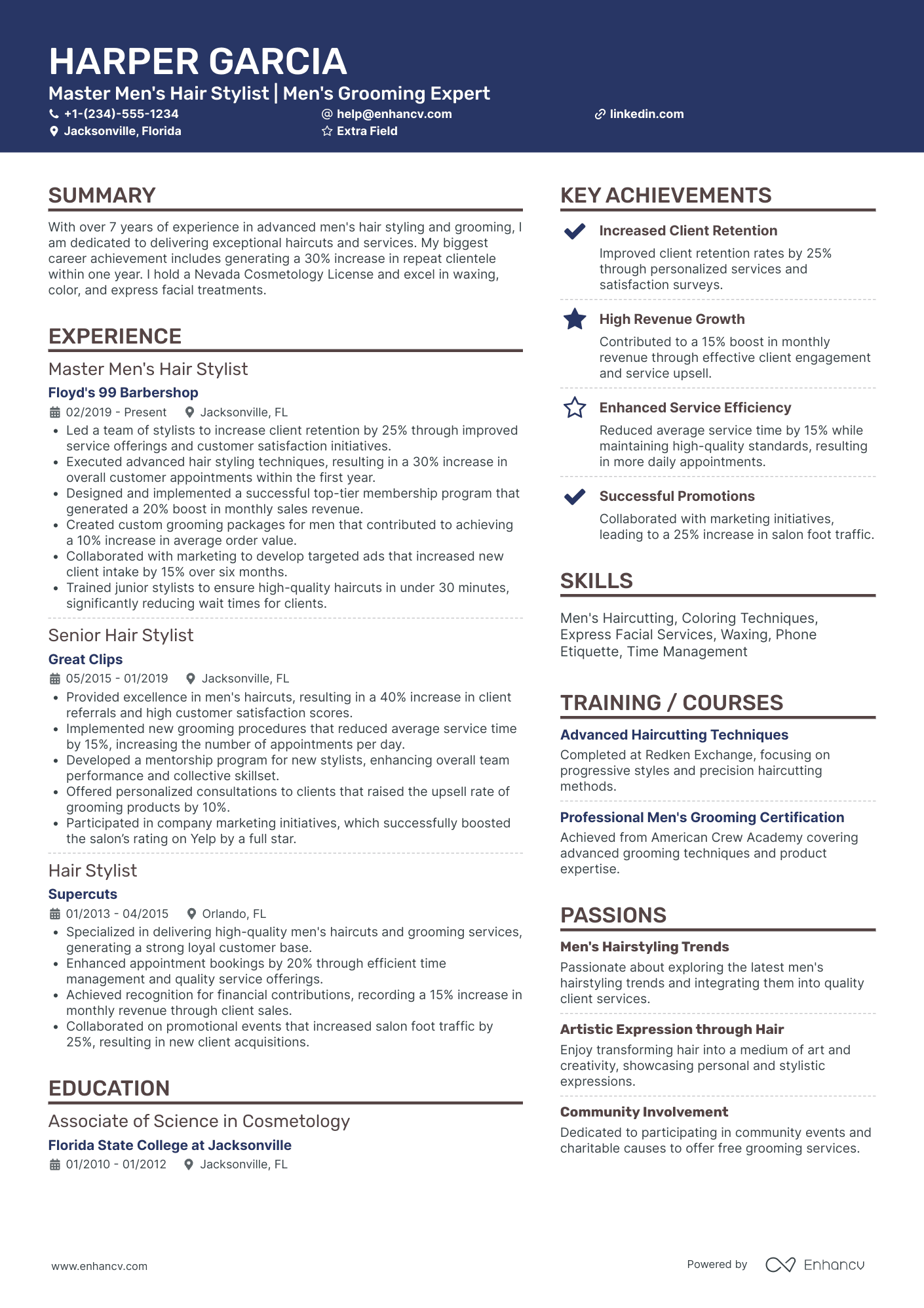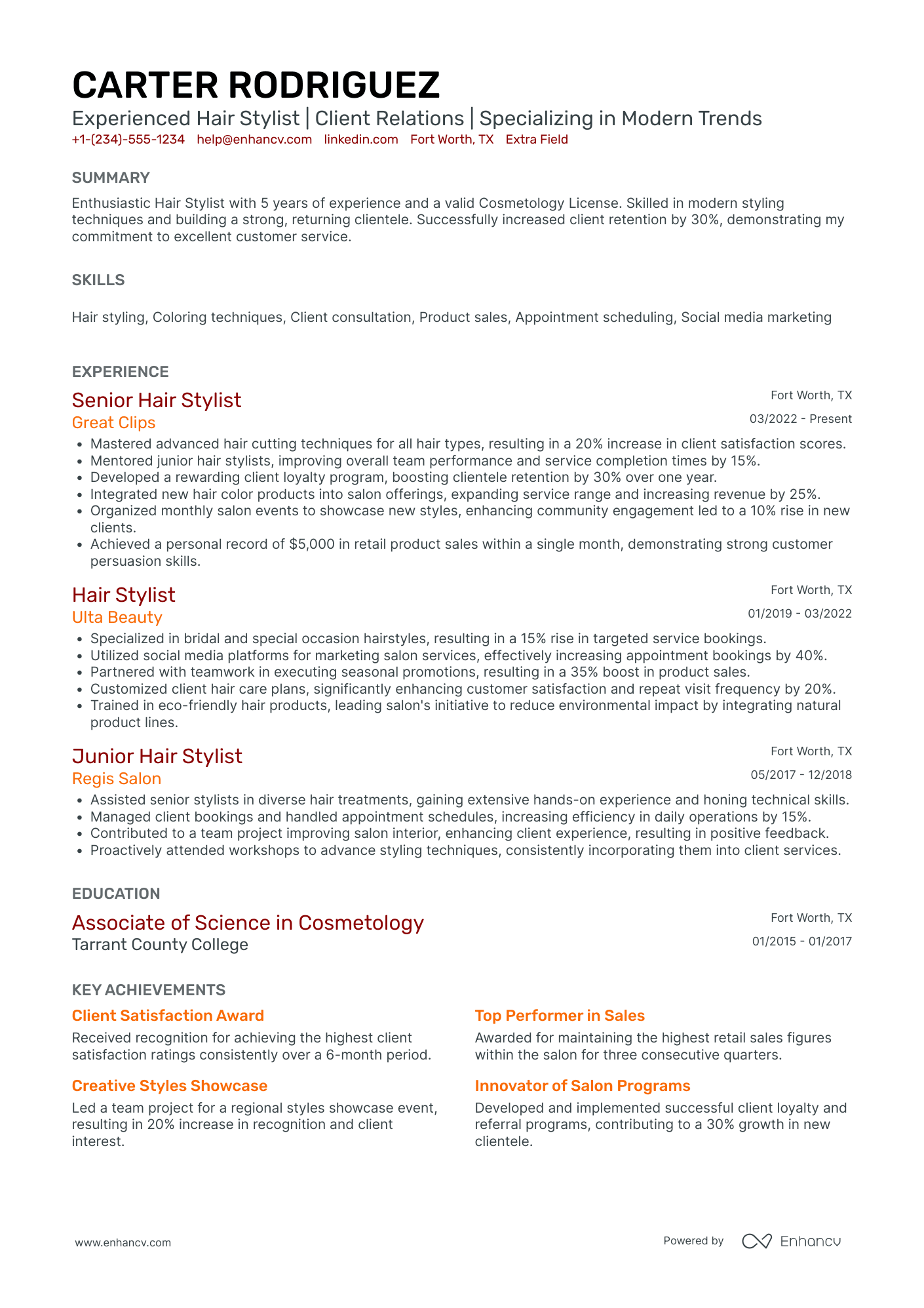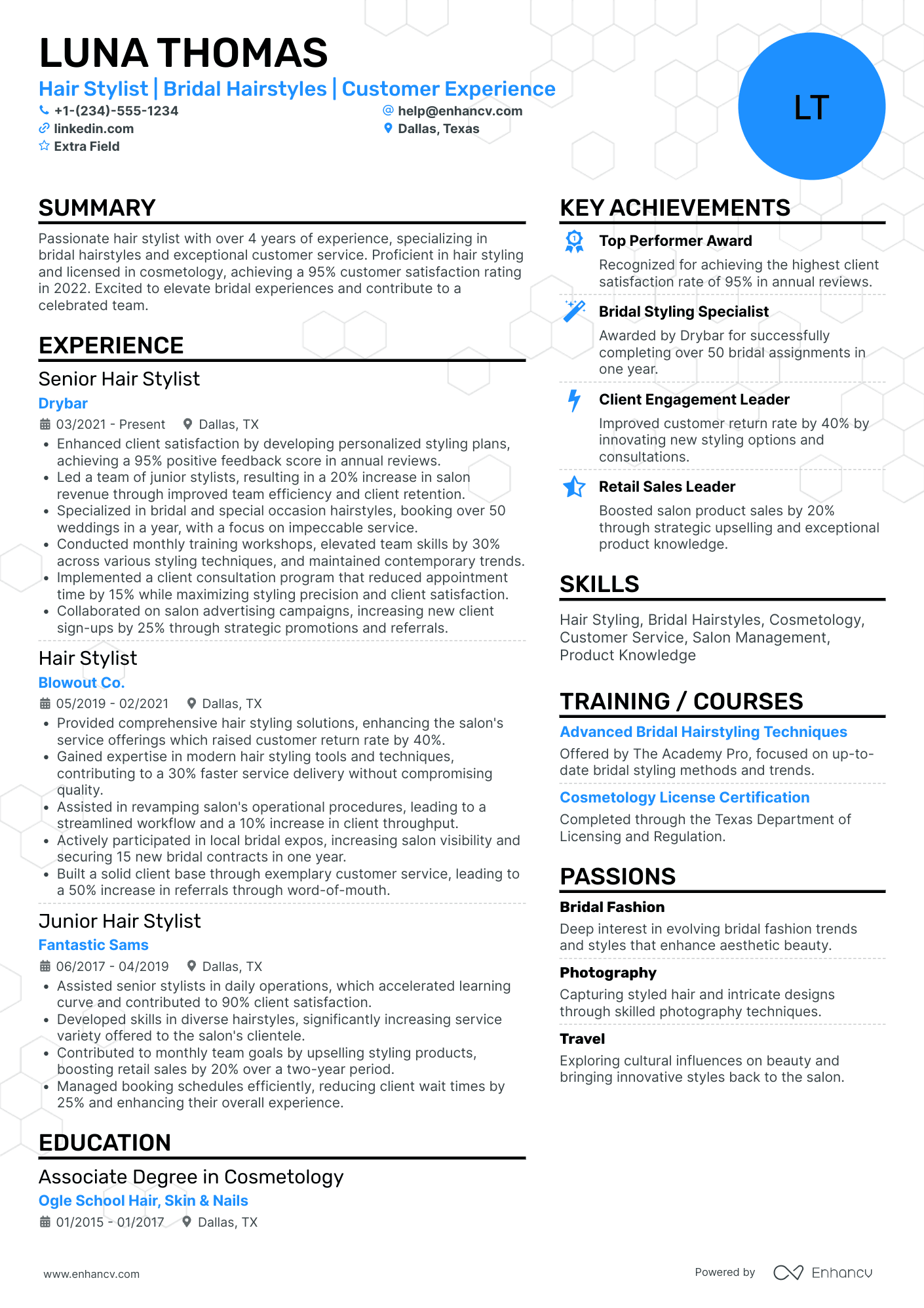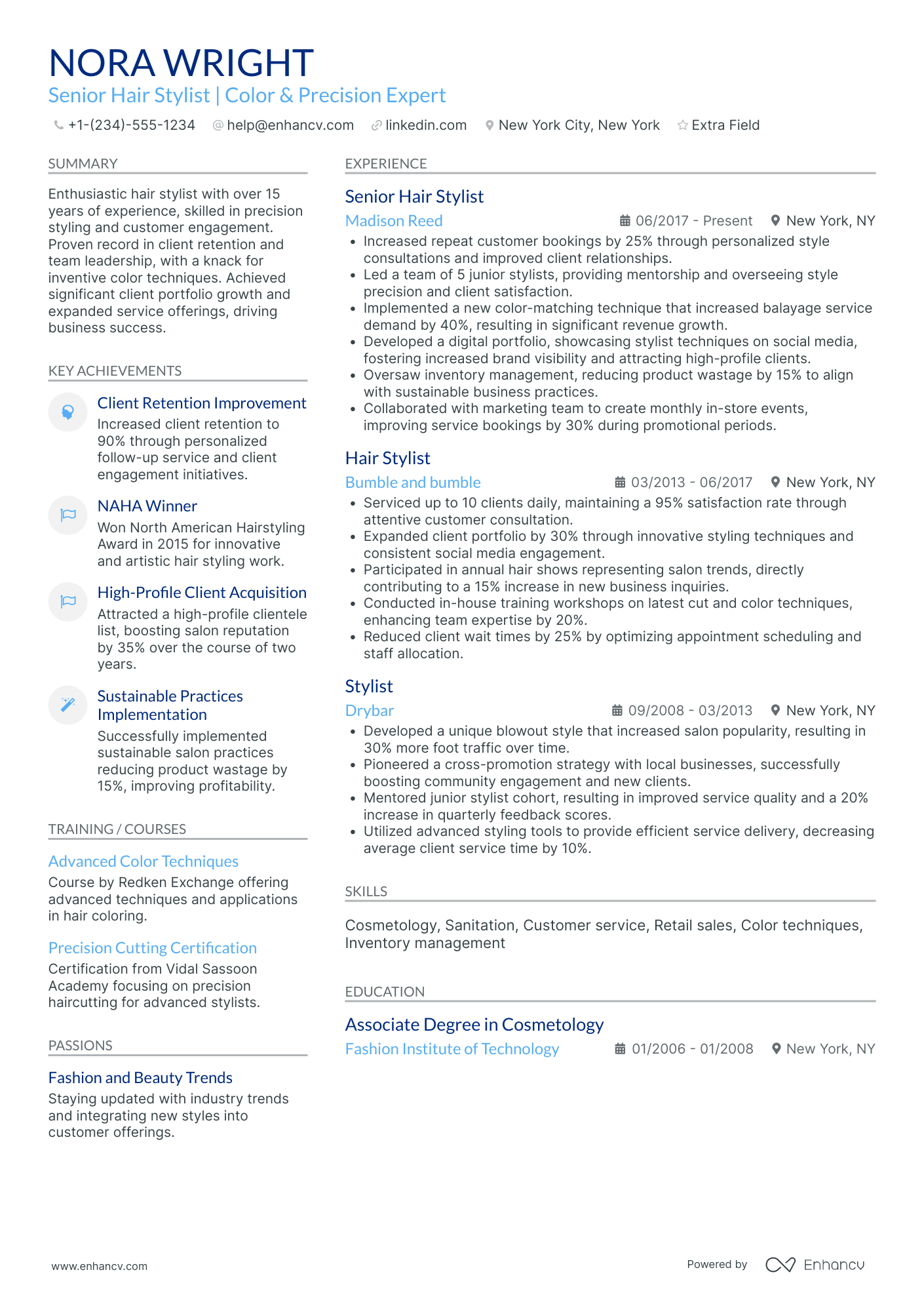Diving into the world of hair styling is an exciting journey! It's a profession where creativity meets skill, allowing you to transform how people see themselves and feel about their appearance. Let's break down what you need to know about getting a job as a hair stylist and then—among other things—analyze a hairstylist resume example.
The future for hair stylists looks promising! The U.S. Bureau of Labor Statistics predicts that jobs in personal appearance, including hair styling, will grow faster than average in the next decade, driven by population growth and heightened interest in grooming and wellness, ensuring a steady demand for stylists.
So, if you're passionate about hair styling and ready to embrace the challenges, the journey ahead is full of opportunities to grow, create, and inspire. Remember, success in this field comes with patience, practice, and a continual eagerness to learn and adapt.
Let’s see how you can craft an amazing hair stylist resume as well as what the actual purpose of a resume is.
Here are some other guides connected to the personal appearance field:
- Beauty Consultant Resume Guide
- Cosmetologist Resume Guide
- Makeup Artist Resume Guide
- Salon Manager Resume Guide
- Fashion Stylist Resume Guide
Common obstacles faced by hair stylists when crafting a resume
First things first, let’s just go over some of the difficulties you may encounter during your job search and resume creation process.
- Demonstrating specialized skills: hair stylists require a unique set of skills such as cutting, coloring, and maintaining a variety of hairstyles. The challenge lies in effectively communicating these abilities on your resume.
- Listing appropriate certifications: hair stylists must possess certain certifications or licenses to practice their profession. However, you may struggle to mention these properly on your resume.
- Deciding on including experience: You may face the challenge of deciding what work experience to include. Many stylists work freelance, or in different positions like a salon assistant or hairdresser. It can be difficult to decide which experiences to prioritize.
- Showcasing creativity: One of the key characteristics of a successful stylist is the ability to create stunning looks and styles. However, expressing this creativity in a text-based resume can be challenging.
- Highlighting customer service skills: hair stylists need excellent customer service skills. But, these soft skills can be hard to quantify and represent effectively.
PRO TIP
Build a strong online presence! In today's digital age, having an engaging online portfolio or social media account showcasing your work can significantly increase your visibility and appeal to potential employers. Highlight before-and-after transformations, creative styles, and any special techniques or certifications. This not only demonstrates your skills but also your passion and commitment to the craft, making you stand out in the competitive hair styling job market.
How to format a hair stylist resume
Crafting a standout hair stylist resume requires a blend of professional formatting, clear design choices, and strategic content placement to ensure you catch the eye of salon owners and pass through Applicant Tracking Systems (ATS).
Accepted resume formats for the job
- Reverse chronological resume: Emphasizes your work history, showcasing your experience and progression in the beauty industry.
- Functional resume: Focuses on your skills and qualifications, ideal for those with less traditional career paths or new to the field.
- Combination (hybrid) resume: Blends both chronological and functional formats, highlighting your skills followed by your work history.
Resume designs
- Margins: Stick to standard 1-inch margins on all sides.
- Resume colors: Use subtle resume colors for accents if desired, but keep the overall look professional and easy to read.
- Resume fonts: Choose clean, professional resume fonts like Rubik, Arial, Calibri, or Times New Roman, in a size 10-12 for readability.
- Columns: Single-column layouts are most ATS-friendly. If using two columns, ensure critical information is in the main column.
- Resume length: Keep your resume length to one page, especially if you haven’t got much experience.
- Include: Name, phone number, professional email address, and optionally, your LinkedIn profile or online portfolio.
- Resume address: Full address on your resume isn't necessary, city and state will suffice.
- Links: Add links to your professional online profiles or portfolio; ensure they're professional and up-to-date.
- Resume photo: Generally, resume photos aren’t recommended on resumes in the U.S. due to anti-discrimination laws.
Align your resume with the market’s standards – Canadian resumes may have unique layout guidelines.
Your resume is your first handshake with an employer. It’s the first impression you make and, if done well, can be a powerful asset in your career toolkit.
Amanda Augustine, career advice expert
ATS compatibility
- Keywords: Use job-specific resume keywords throughout your resume, especially in the skills and experience sections.
- Simple formatting: Avoid headers, footers, tables, or other complex formatting that might confuse ATS scanners.
- Bullet points: Use bullet points for easy readability, focusing on achievements and responsibilities in your roles.
File formatting and naming convention
- Format: Resumes in PDF are typically preferred to preserve formatting, but some employers might request a Word document.
- Naming convention: Use a clear and professional format, such as "FirstNameLastNameHairStylist_Resume.pdf".
Remember, the goal of your resume is to succinctly showcase your skills, experience, and the unique qualities you bring to the role. Be sure to tailor your resume for each job application.
Is your resume good enough?
Drop your resume here or choose a file. PDF & DOCX only. Max 2MB file size.
Keep in mind these sections in your hair stylist resume:
The top sections on a hair stylist's resume
- Contact information: Add this so the employer can reach out for an interview.
- Objective statement or summary: Include this as a brief overview of your career goals specific to hairstyling.
- Skills and competencies: Highlight your hair styling, customer service, and other relevant skills here to show you're qualified for the job.
- Work experience: Detail your previous jobs as a hairstylist or in related fields to showcase your professional background.
- Certifications and licenses: Demonstrate your professional qualifications and that you're legally approved to perform the role.
Besides including the most important sections listed above in your resume, it’s also imperative to try and touch upon the elements most recruiters keep an out for—you may notice some things repeat.
Check out the following:
What recruiters want to see on your resume
- Hairstyling skills: Recruiters prioritize this to ensure the applicant can competently carry out the fundamental tasks of the role.
- Client service skills: These are important in the hairstyling industry to guarantee a positive client experience.
- Knowledge of latest trends: This ensures that the stylist can provide current and in-demand hairstyles to clients.
- Certifications and/or licenses: Recruiters look for these to guarantee the hairstylist meets industry standards and local regulations.
- Portfolio of work: This allows recruiters to visually assess the applicant's skills and creativity.
How to write your hair stylist resume experience
Crafting an effective resume as a hair stylist involves showcasing your skills, experience, and achievements in a manner that's both clear and engaging to potential employers. Here's how you can best list your work experience on a resume:
Format for listing experience:
- Position title: Start with your job title, such as "Senior hair stylist" or "Salon Manager."
- Salon/Company name, location: Follow with the name of the salon or company and its location (city, state).
- Employment dates: Include the start and end dates of your employment. Use month and year format.
- Key responsibilities and achievements: List your responsibilities and quantifiable achievements using bullet points. Focus on what sets you apart, such as specific techniques you excel in, customer satisfaction rates, or any initiatives you led.
Here’s the first example:
- •Did haircuts and colors.
- •Sold some products.
- •Cleaned the salon.
Why this is bad:
- Vague descriptions: Uses broad, undefined tasks (e.g., "did haircuts and colors") without detailing the type of cuts, colors, or any specialty services.
- Lack of achievements: Fails to mention any achievements or quantifiable outcomes.
- No indication of growth or contribution: Doesn't highlight any initiatives taken to contribute to the salon's success or personal development in the role.
Now, let’s consider the correct way to list your job experience. Have a look at this one:
- •Spearheaded the introduction of a new organic product line, increasing customer satisfaction by 20%.
- •Trained 5 junior stylists in advanced coloring techniques, contributing to a 15% increase in salon revenue.
- •Consistently received 5-star client reviews for exceptional service and innovative hair styling.
- •Organized monthly creative hair styling workshops, enhancing team skills and salon offerings.
Why this is good:
- Specific achievements: Lists clear, quantifiable achievements (e.g., revenue increase, customer satisfaction).
- Leadership and initiative: Highlights leadership roles and initiatives taken to improve the salon's offerings and revenue.
- Skills development: Shows a commitment to personal and team development through training and workshops.
- Client satisfaction: Emphasizes a track record of high client satisfaction.
Tips for listing work experience on a hair stylist resume:
Highlight specialized skills: Mention any specialized skills or certifications, like expertise in unique hair treatment, advanced cutting techniques, or mastery in styling for special events.
Quantify your impact: Use numbers to quantify your achievements when possible, such as percentage increases in bookings, sales, or client satisfaction. See below for more tips on this!
Showcase your creativity: Mention any creative contributions, such as participating in hair shows, styling for photoshoots, or contributing to salon marketing campaigns.
Professional development: Include any ongoing education or workshops you've attended to stay current with the latest trends and techniques in hairstyling.
Soft skills: Don't forget to include soft skills crucial for hairstylists, such as communication, customer service, and teamwork.
Structuring your resume in this way not only provides a clear overview of your professional history but also showcases the unique value you can bring to a prospective employer.
How to quantify impact on your resume
This is an essential element and we can’t recommend enough that you keep these ideas in your mind while writing your resume.
- List the average number of clients served daily: This can demonstrate your ability to handle high workloads and manage time efficiently.
- Include the number of hairstyles you're proficient in: This quantifies your versatility and ability to cater to varying client requests.
- Mention the success rate of customer satisfaction surveys: This shows the recruiter your dedication to client satisfaction.
- Specify any increase in client retention rate at your previous employment: This can emphasize your relationship-building skills and consistency in providing quality service.
- Indicate the percentage of clients who requested repeat services with you specifically: This highlights customer satisfaction and trust in your skills.
- State the number of industry-related trainings or courses completed: This shows your commitment to continuous learning and professional development.
- If you've supervised or trained others, provide the number of stylists you've mentored: This highlights leadership and mentoring skills.
- Specify the percentage of time, you've saved in executing common hairstyling procedures: This can showcase your efficiency and time management skills.
How do I write a hair stylist resume with no experience
If you don't have relevant work experience for your hair stylist resume, focus on additional sections showcasing your passion, skills, education, and any exposure you've had to the industry, even if it wasn't paid work.
Be sure to do the following and make your resume stand out:
- Emphasize education and training: We explain this much more in the education section a bit further on in the article.
- Showcase relevant skills: Below we’ll get more into this.
- Include volunteer work or internships: See the ‘additional sections for a hair stylist resume’ entry at the bottom of this article for more detailed information.
- Highlight academic achievements: See the ‘additional sections for a hair stylist resume’ entry at the bottom of this article for more detailed information.
- Leverage personal projects or social media: If you’ve styled hair for friends and family for special events or maintained a social media account showcasing your hair styling work, include this information.
- Network and seek mentorship: Networking can sometimes open doors faster than a resume. Attend industry events, join beauty and hairstyling groups, and connect with professionals on social media.
- Write a compelling objective statement: We talk about this more in a little bit—keep reading!
- Craft a cover letter: Use your cover letter to tell your story. Explain why you're passionate about hairstyling, how you've pursued this passion so far, and what you're looking for in a position. Highlight how you plan to contribute positively to the salon, despite lacking traditional work experience.
By focusing on these areas, you can create a resume and cover letter that showcase your potential, enthusiasm, and readiness to start your career as a hair stylist, even without direct work experience.
How to list your hard skills and soft skills on your resume
Listing your skills on a hair stylist's resume is crucial for several reasons:
- Showcase your expertise
- Demonstrate your professionalism
- Match job descriptions
- Highlight your unique offerings
- Provide a quick overview
- Support your experience
- Show your readiness to contribute
- Reflect on your commitment to growth
In essence, your resume skills section isn’t just a list of abilities; it's a strategic tool that communicates your value as a hair stylist, your fit for the specific role, and your potential to contribute to the salon's success.
There are two equally important types of skill sets: hard skills and soft. Hard skills on a resume are technical, teachable abilities specific to a job, like hair coloring techniques. Resume soft skills are interpersonal traits, such as communication or teamwork, applicable across various jobs.
Here are two extensive lists related to a hair stylist:
Best hard skills for your hair stylist resume
- Haircutting techniques
- Hair coloring techniques
- Hair styling techniques
- Knowledge of hair treatment products
- Blow drying skills
- Chemical mixing
- Weaving and extensions
- Razor cutting techniques
- Balayage techniques
- Knowledge of using styling tools
- Application of hair products
- Perm techniques
- Hair smoothening techniques
- Keratin treatment techniques
- Foiling techniques
- Knowledge of using sterilization tools
- Knowledge of using various hair conditioners
- Knowledge of using hair repair treatments
Best soft skills for your hair stylist resume
- Customer service skills
- Communication skills
- Creativity
- Time management skills
- Active listening skills
- Reliability
- Problem-solving abilities
- Detail-orientated
- Patience
- Adaptability
- Teamwork skills
- Decision-making abilities
- Organizational skills
- Multitasking skills
- Negotiation skills
- Interpersonal skills
- Confidence
- Resilience
- Create a good rapport
In essence, your skills section isn’t just a list of abilities; it's a strategic tool that communicates your value as a hair stylist, your fit for the specific role, and your potential to contribute to the salon's success.
Certifications and education on your resume
Listing education and certifications on a resume is essential for hair stylists, as it strengthens professional credibility, provides a competitive edge, and complies with industry regulations. Formal qualifications demonstrate a commitment to the craft, which can attract both employers and clients.
Including certifications can also highlight legal compliance and specialized expertise, making a stylist more appealing in a competitive market. These elements combined seriously contribute to a hair stylist's professional image and career opportunities.
Education
Here’s how you should list your formal education on a resume:
- Start with the most recent educational achievement
- Include the name of the institution and its location
- State your degree, diploma, or certification: For a hair stylist, this could include cosmetology degrees, hairdressing diplomas, or specific certifications in hair styling techniques.
- Mention the graduation date or expected completion date
- Highlight relevant coursework, specializations, and honors
- Professional licenses
Below is an example of a well-presented education listing:
- •Completed 1,500 hours of specialized training in cutting, styling, and coloring.
- •Awarded for excellence in creative hair design techniques.
- •Certified in modern hair straightening and extensions application.
Why it’s good:
- Specifics and clarity: Lists the exact nature of the qualification (Licensed Cosmetologist), making the candidate's qualifications clear at a glance.
- Relevance: Highlights specialized training relevant to the hairstyling profession, directly aligning with job requirements.
- Achievements: Including an award showcases recognition within the field, adding credibility and distinguishing the candidate from others.
- Additional certifications: Mentioning certifications beyond the primary cosmetology license (e.g., hair straightening, extensions) demonstrates a broad skill set and commitment to professional development.
A note on GPA. Grade Point Average on a resume is often omitted unless required by the employer, so unless it’s relevant or over 3.5, don’t worry about it.
Certification
To list a certification on a hair stylist resume effectively, you need to make sure that the information is presented clearly and concisely, highlighting your additional skills and expertise. Here's a structure you can follow:
- Certification title: Start with the official name of the certification.
- Certifying organization: Include the name of the organization that issued the certification.
- Date of certification: Mention the month and year you obtained the certification. If it's a certification that requires renewal, include the expiration date.
- Relevance: Briefly explain how this certification is relevant, especially if it's a specialized skill that sets you apart from other candidates.
- Location (Optional): If the certification is recognized or required in specific regions or states, mention the location.
Let’s look at a good listing:
- •Demonstrates advanced competency in hair coloring techniques and theory.
- •Recognized for achieving high standards in color selection, application, and correction.
We’ve put together a short list of some of the more desirable certifications out there for hair stylists. Have a look and consider exploring them further.
Best certifications for your hair stylist resume
Writing your hair stylist resume summary or objective
Including a resume summary or objective statement under your header can make all the difference in the eyes of a recruiter.
A resume summary highlights your experience, skills, and accomplishments, perfect for seasoned stylists to showcase their expertise and value. A resume objective, on the other hand, is more about your career goals and is ideal for new stylists or those changing careers, focusing on what you aim to achieve and how you can contribute.
Both serve to quickly inform employers about your qualifications and intentions, making your resume stand out. Choose based on your experience level and career stage.
Here are a couple of examples that will help illustrate the right and wrong way to present yourself. Let’s start with the wrong way.
Why it’s no good:
- Casual tone: Uses informal language that might be perceived as unprofessional in a resume.
- Lack of specifics: Fails to mention any particular skills, experiences, or achievements that could set the candidate apart.
- Negativity: Expresses disinterest in essential aspects of the job, like sales or learning new techniques, which could be red flags for employers.
- Minimal effort: Indicates a desire for minimal engagement, suggesting the candidate isn’t willing to contribute significantly to the salon's success or take on responsibilities.
Now for a much better version.
Why it’s so good:
- Professional tone: Uses professional language that conveys a serious and committed approach to the career.
- Specific experience: Mentions the exact years of experience, indicating a solid background in the field.
- Skill highlight: Clearly outlines specific skills and techniques mastered, showcasing versatility and expertise.
- Achievements: Mentions increasing salon revenue, demonstrating an impact beyond basic job duties.
- Client focus: Emphasizes client satisfaction and interpersonal skills, critical in service-oriented roles.
- Growth mindset: Shows eagerness to contribute to a salon's success, indicating a team player and continuous learner.
Keep these elements in mind the next time you craft a summary or objective statement.
Additional sections for a hair stylist resume
If you happen to have some extra space on your resume and would like to fill it with meaningful content, here a a few ideas for sections that you can add.
- Professional memberships: Mention memberships in professional organizations, such as the Professional Beauty Association, to illustrate your commitment to the industry.
- Client retention rate: Noting a high client retention rate can signal your skill in client satisfaction and loyalty.
- Community service: Listing volunteering on a resume related to hairstyling, such as offering services at local shelters or events, can demonstrate your willingness to give back and your ability to work in diverse environments.
- Testimonials: Short quotes from satisfied clients or employers can provide credible insights into your professionalism, skill, and work ethic.
Key takeaways
Hopefully, you now feel more confident in taking on your resume creation. Let’s just quickly recap a few of the more important points that we covered:
- There are a few obstacles that face hair stylists while crafting their resumes. However, with the right tools and knowledge, you’ll be able to not only overcome them but excel at doing so.
- There are three possible directions to go in terms of resume format. Each depends heavily on your current situation in the industry. Remember, a safe bet for a creative position has always been with the hybrid format.
- When listing your previous employment, make sure to do so in reverse chronological order. Use the typical format for listing and be sure to follow the tips to create an impactful and informative entry.
- Don’t be put off by a lack of relevant work experience! There are ways to get around that and still have an excellent chance of the recruiter calling you back.
- Choose your skills wisely and provide a rich variety of both hard and soft. Make sure you tailor them to the job description.
- Education and certification are essential so be sure that you have everything that the potential employer is looking for—including licenses. Follow the format and tips above for the most effective way to list them.
- Don’t forget about dedicating a good amount of time to writing a convincing and appealing resume summary or objective. This is the first thing recruiters consider, so make it great!
Hair Stylist resume examples
By Experience
Senior Hair Stylist
Junior Hair Stylist
Student Hair Stylist
Master Hair Stylist
Hair Stylist Trainee
By Role
